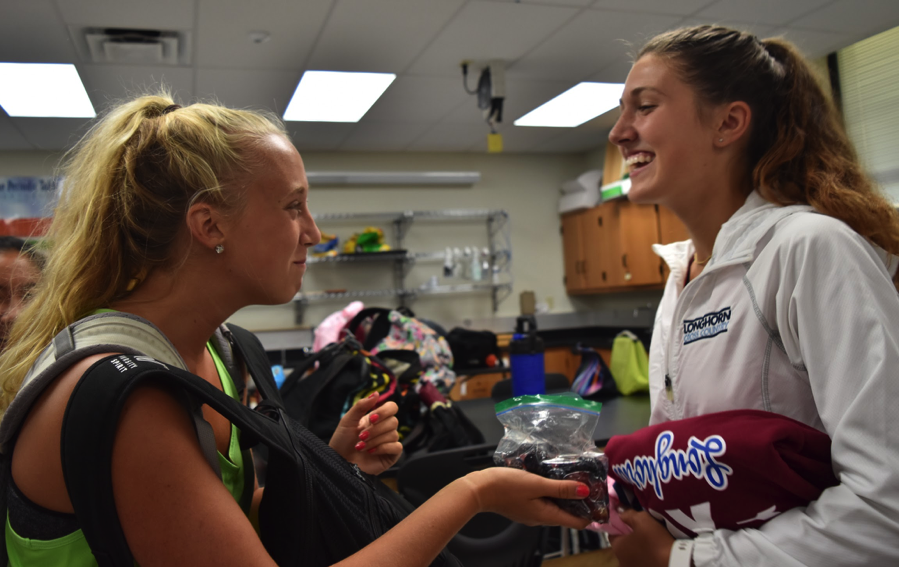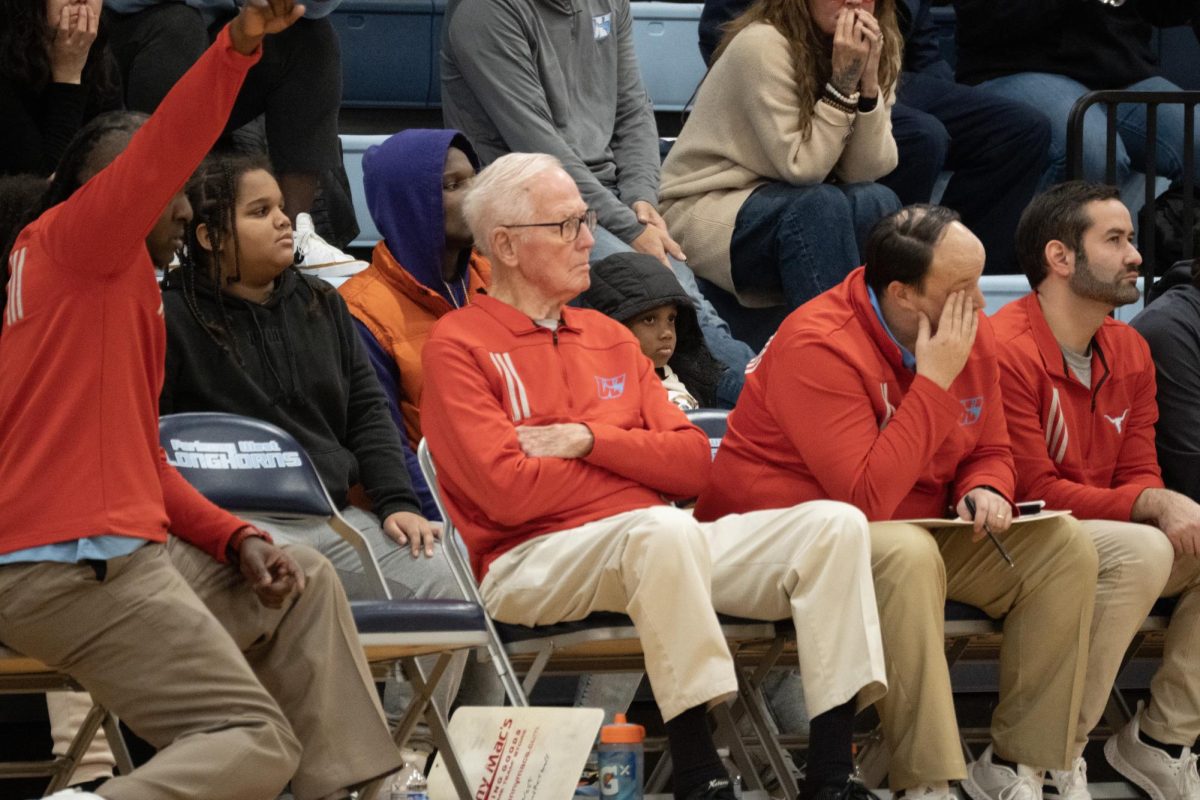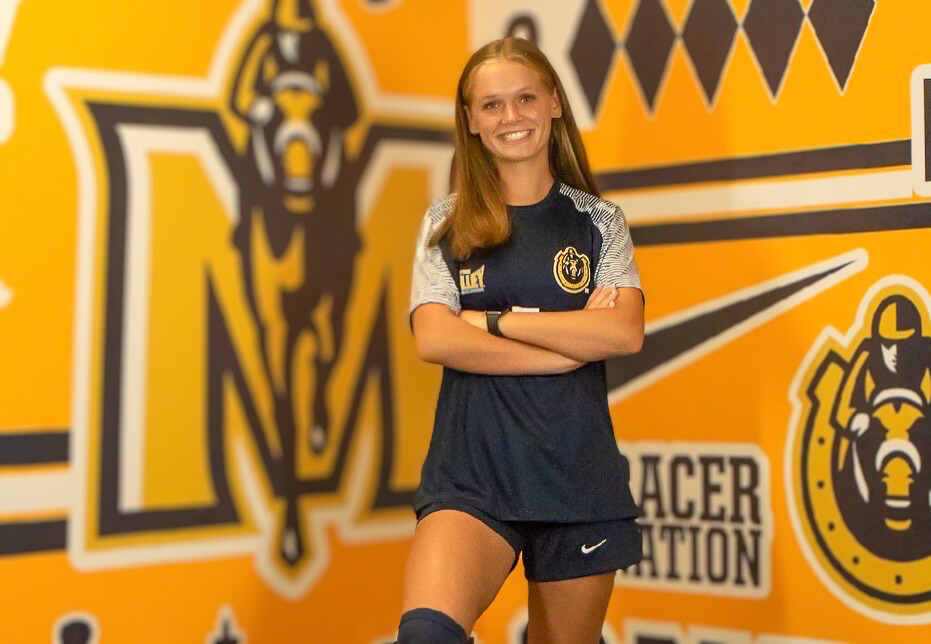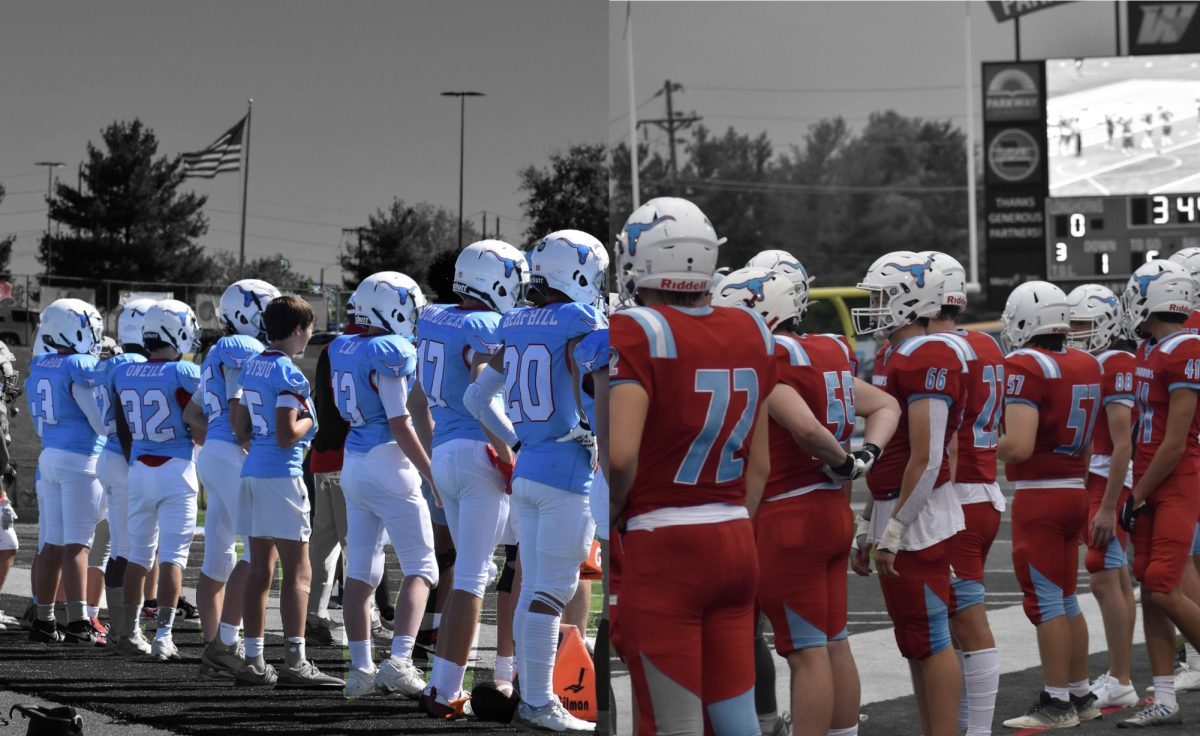Although Parkway’s “food safety expectation” policy, implemented for the 2018 school year, has created uproar among students and staff, it does not apply to extracurricular activities, including athletics.
“Originally, the policy wasn’t going to allow us to do what we needed to do after school, because it’s pretty unsafe to have a kid stay and play a sport and not allow them to eat,” Athletic Director Brian Kessler said. “Certainly we’re not just opening the floodgates and saying, ‘Parents make this, parents make that.’ We’re still requiring packaged foods, but everybody eats their snack, and they need it.”
The safety risks involved when not getting enough nutrients before playing a sport is one of the main reasons students are glad the policy is not in effect for athletics.
“In cross country, eating before you run is really important because you need energy before you use it all up,” sophomore and junior varsity runner Anjali Shah said. “Especially on hard days, the combination of eating and hydrating is really important to keep energized.”
Although some sports are less physically demanding, such as golf, food is also required to ensure the safety of athletes.
“I won’t get home until eight o’clock most days, and tournaments go from 7:30 in the morning to three in the afternoon,” junior and varsity golfer Dani Fischer said. “Since we’re at the course for extended periods of time, we have to eat. If we didn’t share food, we would be starving.”
Not only does food ensure safety, it also provides a way for teammates to bond.
“We usually sit up near the track and eat a snack and vent about our days. I’ve definitely made friendships through that,” Shah said. “It’s fun to see the team being a team outside of practice.”
Fischer is especially thankful that the policy does not apply to extracurricular activities, since she dislikes the policy anyways.
“I didn’t understand [the policy] at the beginning of this school year just because I love food and I loved when teachers brought in food and when people made me food. That just can’t happen anymore, which is devastating,” Fischer said.
In the end, the “food safety expectation” policy is in place as an attempt to keep students safe, inside and out of school hours.
“Think football for example. If they’re going to play a game in Affton on a Friday night, kids aren’t gonna have time to leave, go home, eat and come back. We have to supply them with nutrition so that they can go play their games,” Kessler said. “There’s circumstances outside of the school day where we just need to do some things for kids nutritionally to make sure their bodies are fueled properly.”




![Smiling in a sea of Longhorns, Fox 2 reporter Ty Hawkins joins junior Darren Young during the morning Oct. 3 pep rally. The last time West was featured in this segment was 2011. “[I hope people see this and think] if you come to [Parkway] West, you will have the time of your life because there are so many fun activities to do that make it feel like you belong here. I was surprised so many people attended, but it was a lot of fun,” Young said.](https://pwestpathfinder.com/wp-content/uploads/2025/10/Edited2-1200x798.jpg)
![West High seniors and families listen as a representative of The Scholarship Foundation of St. Louis, Teresa Steinkamp, leads a Free Application for Federal Student Aid (FAFSA) workshop. This session, held in the library, provided guidance on financial aid, scholarships and student loan options. “This event is very beneficial for any seniors who are applying to or considering applying to colleges after high school [because] the cost of college is on the rise for seniors and parents,” college and career counselor Chris Lorenz said.](https://pwestpathfinder.com/wp-content/uploads/2025/09/DSC_4478-1200x778.jpg)
![Senior Kamori Berry walks across the field during halftime at the Homecoming football game on Sept. 12. During the pep assembly earlier that day, she was pronounced Homecoming Queen. “I thought it was nice that the crowd [started] cheering right away. I know [my friends] were really excited for me, and my family was happy because typically non-white people don't win,” Berry said.](https://pwestpathfinder.com/wp-content/uploads/2025/09/DSC7046-Enhanced-NR-1200x798.jpg)



![Pitching the ball on Apr. 14, senior Henry Wild and his team play against Belleville East. Wild was named scholar athlete of the year by St. Louis Post-Dispatch after maintaining a high cumulative GPA and staying involved with athletics for all of high school. “It’s an amazing honor. I feel very blessed to have the opportunity to represent my school [and] what [it] stands for,” Wild said.](https://pwestpathfinder.com/wp-content/uploads/2025/05/unnamed-6-1200x714.jpg)
![The Glory of Missouri award recipients stand with their certificates after finding out which virtue they were chosen to represent. When discovering their virtues, some recipients were met with contented confirmation, while others, complete surprise. “I was not at all surprised to get Truth. I discussed that with some of the other people who were getting the awards as well, and that came up as something I might get. Being in journalism, [Fellowship of Christian Athletes and] Speech and Debate, there's a culture of really caring about truth as a principle that I've tried to contribute to as well. I was very glad; [Truth] was a great one to get,” senior Will Gonsior said.](https://pwestpathfinder.com/wp-content/uploads/2025/04/Group-Glory-of-Missouri.jpg)

![Focused on providing exceptional service, sophomore Darsh Mahapatra carefully cleans the door of a customer’s car. Mahapatra has always believed his customers deserve nothing less than the best. “[If] they’re trusting us with their car and our service, then I am convinced that they deserve our 100 percent effort and beyond,” Mahapatra said.](https://pwestpathfinder.com/wp-content/uploads/2025/10/DSC_0018-1200x800.jpg)
![Sophomore Aleix Pi de Cabanyes Navarro (left) finishes up a soccer game while junior Ava Muench (right) warms up for cross country practice. The two came to Parkway West High School as exchange students for the 2025-2026 school year. “The goal for the [exchange] program is to provide opportunities for both Parkway students and our international exchange students to learn about other cultures, build connections and become confident, capable, curious and caring — Parkway’s Four C’s — in the process,” Exchange Program Lead Lauren Farrelly said.](https://pwestpathfinder.com/wp-content/uploads/2025/10/Feature-Photo-1200x800.png)
![Leaning on the podium, superintendent Melissa Schneider speaks to Parkway journalism students during a press conference. Schneider joined Parkway in July after working in the Thompson School District in Colorado. “My plan [to bond with students] is to get things on my calendar as much as possible. For example, being in [classes] is very special to me. I am trying to be opportunistic [meeting] kids [and] being in [the school] buildings. I have all the sports schedules and the fine arts schedules on my calendar, so that when I'm available, I can get to them,” Schneider said.](https://pwestpathfinder.com/wp-content/uploads/2025/09/IMG_5425-1200x943.jpeg)
![Gazing across the stage, sophomore Alexis Monteleone performs in the school theater. The Monteleone family’s band “Monte and the Machine” has been releasing music since 2012, but Alexis started her own solo career in 2024 with the release of her first single, Crying Skies. “My whole family is very musical, [and I especially] love writing [songs with them],” Monteleone said.](https://pwestpathfinder.com/wp-content/uploads/2025/09/DSC7463-1200x798.jpg)
![Leaping through the air, senior Tyler Watts celebrates his first goal of the season, which put the Longhorns up 1-0 against the Lafayette Lancers. Watts decided to play soccer for West for his last year of high school and secured a spot on the varsity roster. “[Playing soccer for West] is something I had always dreamed of, but hadn’t really had a good opportunity to do until now. It’s [really] fun being out [on the field], and I’m glad I decided to join the team. It’s just all about having fun with the boys and enjoying what time we have left together,” Watts said.](https://pwestpathfinder.com/wp-content/uploads/2025/09/DSC_1951-1200x855.jpg)

![Junior Fiona Dye lifts weights in Strength and Conditioning. Now that the Trump administration has instituted policies such as AI deregulation, tariffs and university funding freezes, women may have to work twice as hard to get half as far. "[Trump] wants America to be more divided; he wants to inspire hatred in people,” feminist club member and junior Clara Lazarini said.](https://pwestpathfinder.com/wp-content/uploads/2025/05/Flag.png)
![As the Trump administration cracks down on immigration, it scapegoats many immigrants for the United States’ plights, precipitating a possible genocide. Sophomore Annabella Whiteley moved from the United Kingdom when she was eight. “It’s pretty scary because I’m on a visa. When my visa expires next year, I’m not sure what’s going to happen, especially with [immigration] policies up in the air, so it is a concern for my family,” Whiteley said.](https://pwestpathfinder.com/wp-content/uploads/2025/05/DSC_0077-7copy.jpg)
![Shifting global trade, President Donald Trump’s tariffs are raising concerns about economic stability for the U.S. and other countries alike. “[The tariffs are] going to pose a distinct challenge to the U.S. economy and a challenge to the global economy on the whole because it's going to greatly upset who trades with who and where resources and products are going to come from,” social studies teacher Melvin Trotier said.](https://pwestpathfinder.com/wp-content/uploads/2025/05/MDB_3456-1200x800.jpg)
![Red, white and blue, the American flag holds the values of our democracy. The fight that we once endured has returned, as student journalists and senior correspondents across the country are losing their voices due to government control. “[Are] the White House and [the] government limiting free speech [and] freedom of the press? Yes [they are],” chief communications officer of the Parkway School District and former journalist Elisa Tomich said.](https://pwestpathfinder.com/wp-content/uploads/2025/03/Untitled-design-14.jpg)
![The varsity boys cross country team poses for a photo at the Mike Rose Soccer Complex in Memphis, Tenn. The Memphis Twilight Classic is the largest event the team attends. “[I enjoyed] hanging out with the team every day at practice,” Patten said. “I wanted to be the best I could for my team; I really wanted to help out.”](https://pwestpathfinder.com/wp-content/uploads/2025/09/XC-PHOTO-1200x822.jpg)

![Celebrating their landmark victory, the Parkway West Boys Hockey team gathers together on the ice. Over the course of the season, the team grew closer together while pursuing their final goal: winning the coveted Wickenheiser Cup. “[Winning the cup] was awesome. [As] a senior, it was super rewarding to end on a high note. It had to be the most memorable part of my career,” varsity hockey player and senior Hunter Beach said.](https://pwestpathfinder.com/wp-content/uploads/2025/03/DSC3974-Enhanced-NR-1200x799.jpg)

![Holding the disc, senior Nathan Thompson waits for an opportunity to pass to senior Timmy Fry. Parkway United’s ultimate frisbee team is made up of students from each of the four Parkway schools. “The one thing I really like about ultimate [frisbee] is the community because it’s so different from any other sport I've been a part of. [My] national teammates are people who we play against in the regular season, so we see each other all the time. It's always fun hanging out with [them],” Thompson said.](https://pwestpathfinder.com/wp-content/uploads/2024/12/C96A6823-1200x800.jpg)
![Senior Josie Grunzinger watches the football game intently from the sidelines on Oct. 18. Grunzinger stood out to the crowd as the only girl on the football team, encouraging other girls who want to play football to take a chance and go for a sport outside of their comfort zone. “If you think you could [play football] and you want to do it, just try it, because all it takes is to actually try it out,” Grunzinger said.](https://pwestpathfinder.com/wp-content/uploads/2024/10/Untitled-design-1200x675.png)


![With her arms held high, junior Jenna Rickelman throws the ball across the pool during a girls water polo practice. With hours of practice after school and over the summer, Rickelman saw many improvements in her water polo skills. “When I look at [my] stats, I'm so much better than I was last year,” Rickelman said.](https://pwestpathfinder.com/wp-content/uploads/2024/05/Untitled-design-2-.png)
![Putting on his helmet, catcher and senior Tommy Eschbach prepares to get in his primary stance. Despite losing 6-1 against Eureka on April 16, Eschbach didn’t let the tough loss affect his playing or mental health. “It's [so] easy to get caught up in the sport and what you're doing that [after] one bad game or a stretch of games it is hard to remind yourself that your worth as a person isn't directly related to your performance on the field,” Eschbach said.](https://pwestpathfinder.com/wp-content/uploads/2024/05/DSC_0415-1-1-1200x800.jpg)
